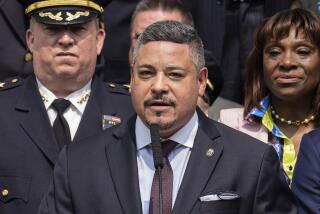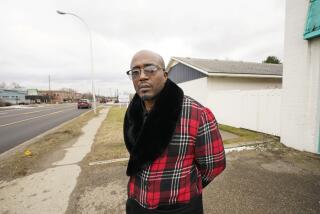A Killing Puts Courts on Trial in Iraq
- Share via
AMARAH, Iraq — When a local police chief was shot in the forehead in this impoverished southern Iraqi city, the killing passed largely unnoticed. But a month later, the case is emerging as a test of the justice system in Iraq.
Three brothers are implicated in the killing. One, the leader of an influential tribe, served on the U.S.-appointed Iraqi Governing Council, which was recently disbanded in favor of an interim government. Another is governor of Maysan province in southern Iraq.
The May 15 shooting occurred in daylight, in front of more than 100 people, in the driveway of Amarah’s main public hospital. The victim, Mohammed Abdel Hassan Imshani, was police chief in the neighboring town of Majar.
Dozens of frantic relatives had gathered that afternoon to collect the bodies of 20 Iraqis killed in a gun battle with British troops a day earlier. Rumors circulated that some of the bodies had been mutilated, heightening tensions.
Imshani and the Governing Council member, Abdul Karim Mohammedawi, had once been allies, fighting side by side in southeastern Iraq’s vast marshes as part of the underground resistance against Saddam Hussein. During the last year, however, the men became political rivals in Shiite-dominated Maysan.
They and other city leaders rushed to the hospital that afternoon, shortly after the bodies were released by the British. As they stood over the corpses outside the morgue, the men began to argue. Voices were raised, witnesses recall. Insults were traded. Suddenly, anguished relatives were jolted from their grief by a hail of gunfire. Panicked doctors scrambled out the morgue’s back door and fled in an ambulance.
When it was over, Imshani lay in a pool of blood, shot once in the head. No one else was injured, witnesses said.
In an interview, Mohammedawi, a legendary resistance fighter known as the Prince of the Marshes, said the police chief pulled his gun first, firing five shots at him. His bodyguards fired back in self-defense, Mohammedawi said.
Some witnesses saw it differently, telling Iraqi investigators that Mohammedawi ordered his men to shoot Imshani during the heat of their argument and that Mohammedawi’s brothers, Maysan Gov. Riad Mohammedawi and Salaam Mohammedawi, a bodyguard, complied.
“If Governing Council members and governors can deal with people in this manner, how are the bandits and criminals supposed to act?” said Brig. Gen. Ismael Kadim Arrar, the police chief in Amarah and a friend of Imshani.
Occupation and Iraqi officials are sorting through the evidence in the potentially explosive case and grappling with how to bring justice.
Because the Iraqi courts and police in Amarah were perceived as either too weak or too closely aligned with the tribes involved, officials with the U.S.-led Coalition Provisional Authority quickly moved the investigation to a criminal court in Baghdad.
A judge issued arrest warrants about two weeks ago for Riad and Salaam Mohammedawi. A summons was issued for their brother to appear in court to help determine his level of involvement, an Iraqi source close to the investigation said. At least one witness reported that Karim Mohammedawi had drawn his gun, the source said.
So far, the warrants and summons have not been executed, in part because of the difficulty in finding Iraqi law enforcement officers willing or able to get involved, officials say.
Occupation officials persuaded Riad Mohammedawi to agree to a paid suspension from his governorship until the case is resolved. An aide said he was unavailable for comment.
For Karim Mohammedawi, the case could prove politically embarrassing. He has been invited to serve on a new government body that will select a national council next month. Whether he will participate is unclear. In recent weeks, Mohammedawi had boycotted Governing Council meetings to protest U.S. military action in the holy city of Najaf. He said he had no interest in being part of the interim government.
Mohammedawi has long been viewed as a folk hero in southern Iraq, thanks to the near-mythical tales of his long campaign against Hussein. He evaded capture for years by living and hiding in marshes. In recent weeks, Mohammedawi has sought to broker a peace agreement between the radical Shiite Muslim cleric Muqtada Sadr and U.S. forces in Najaf.
In the interview, he denied that either he or his brother Riad fired their guns that afternoon in Amarah. “Why would we? We have bodyguards,” he said.
According to Mohammedawi, he pushed the police chief behind a wall in an attempt to defuse the argument. Then, he said, Imshani stood on a hospital cot and aimed his gun over the top of the wall, firing at him. A bodyguard returned fire, he said. “He was only protecting me,” Mohammedawi said.
Arrar, the Amarah police chief, called Mohammedawi’s version implausible. Arrar said he had worked with Imshani for years in the Badr Brigade, a former militia controlled by the Supreme Council for Islamic Revolution in Iraq, a political party.
“If he had fired his gun, he would have hit them,” Arrar said. “He was a trained fighter.”
But Arrar insisted that the chief, who had two wives and six children, was unarmed at the time, having left his gun outside the hospital grounds in accordance with regulations.
In Amarah, a city of about 800,000, most residents are afraid to speak about the slaying because it involves such prominent tribes and officials.
Exactly what sparked the argument remains unclear. Some say the dispute began earlier in the day over administrative and budget issues.
Occupation officials believe that the underlying tension stemmed from a simmering power struggle between two Shiite factions: those loyal to the Badr Brigade, including mostly older Shiites who took refuge in Iran during the Hussein regime, and those loyal to Sadr’s Al Mahdi militia -- mostly younger, disenfranchised men.
Tensions have been growing between the factions, particularly as the scheduled June 30 hand-over of sovereignty approaches and Shiites prepare to assume power in many southern cities after years of oppression. Fighting and tensions between Badr loyalists and Al Mahdi militiamen have also been seen in Najaf and Sadr City, a slum of Baghdad.
“This is a political competition,” said one occupation official, speaking on condition of anonymity.
Over the last two months, Mohammedawi appears to have thrown more of his support to Sadr’s followers, a shift that angered some of the Badr supporters, including the police chief.
Now U.S. officials are worried that the investigation might stall or be closed after the interim Iraqi government takes over.
Karim Mohammedawi said he welcomed a formal inquiry and was ready to accept the findings of the Iraqi courts. He also said he was seeking to settle the matter through traditional tribal methods, which can include payment to a deceased person’s family.
Occupation officials want to see the case settled by the new Iraqi legal system to demonstrate that democratic ideals and institutions have taken hold in the country.
“In the old system, if the governor shot someone, nothing would have happened,” the official said. “People want to see that something is different.”
More to Read
Sign up for Essential California
The most important California stories and recommendations in your inbox every morning.
You may occasionally receive promotional content from the Los Angeles Times.










